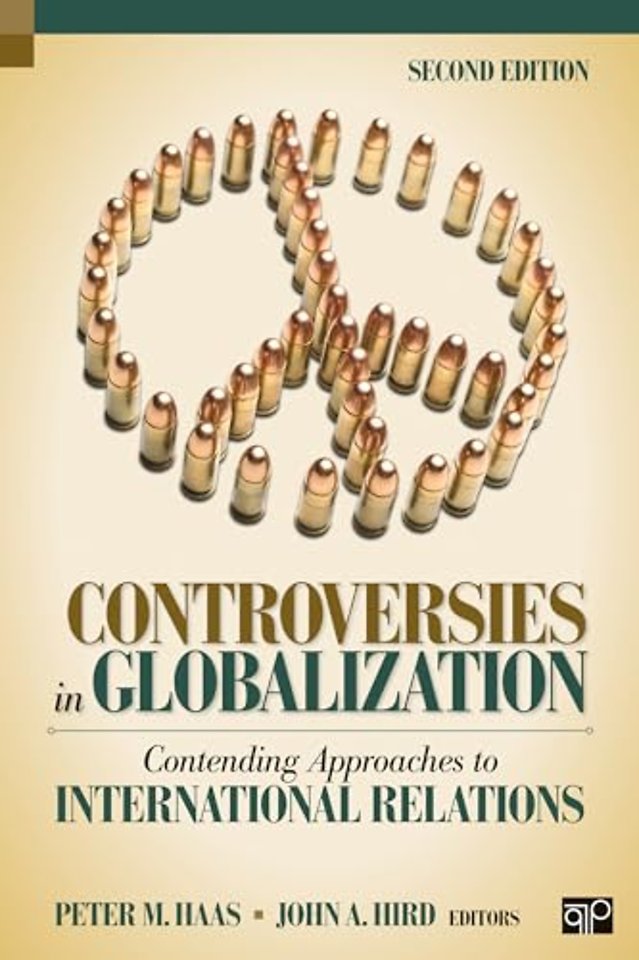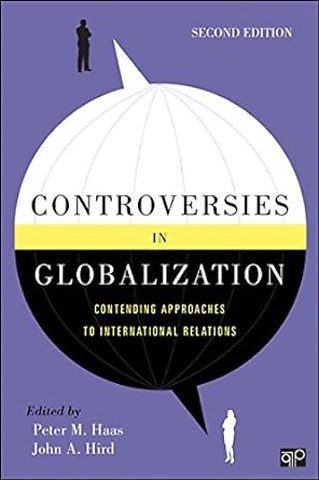


Peter M. Haas (Ph.D., MIT) is professor and Graduate Program Director at University of Massachusetts at Amherst and specializes in international relations, international relations theory, international political economy, international environmental politics, international institutions, and global governance.
Meer over de auteursControversies in Globalization
Contending Approaches to International Relations
Paperback Engels 2022 2e druk 9781608717958Samenvatting
Debate style readers can be powerful teaching tools, but they are only effective in so far as the readings really speak to one another. Without readings in true dialogue, the crux of the debate is lost on students, the reader fails to add real depth to the course, and students are left in the lurch.
Controversies in Globalization solves this issue by inviting 17 pairs of scholars and practitioners to write specifically for the volume, directly addressing current and relevant questions in international relations through concise "yes" and "no" pieces on topics related to security, political economy, the environment, public health, democracy, demography, and social issues like gender and ethnicity. At the request of reviewers, new to this edition are three chapters covering the financial crisis, maritime security, and international conflict. Providing students with necessary context, the editors offer introductions that effectively frame the debate and make clear what is at stake, both from a theoretical as well as from a practical perspective. Concluding discussion questions in each chapter encourage critical thinking and analysis.
Haas and Hird's edited collection helps readers come to terms with the varying perspectives on globalization, and urges critical reflection and the exploration of alternate views.
NEW TO THIS EDITION:
By reviewer request, three new chapters covering critical topics: "Financial Crises: Will Preventing Future Financial Crises Require Concerted International Rulemaking?," "Maritime Security: Does Controlling Piracy and Other Criminal Activities Require Systematic State Interventions?," and "International Conflict: Is War Likely Between the Great Powers?"
- All pieces updated to account for recent events
FEATURES & BENEFITS:
- Each of the chapters' "Yes/No" selections have been carefully written and edited to be in full dialogue with one another;
- The text provides comprehensive coverage of all major topics in international relations including security, political economy, the environment, public health, democracy, demography, and social issues like gender and ethnicity;
- Substantial chapter openers, written by the editors,give crucial context and offer valuable pedagogy for students;
- "Globalization in Action" boxes point to everyday examples of globalization;
- Discussion questions in each chapter encourage critical thinking and analysis;
- Glossary of key terms at the end of the book helps students study and review for exams.
Specificaties
Lezersrecensies
Over John Hird
Inhoudsopgave
David Dollar and Robert H. Wade
Chapter 1: Trade Liberalization and Economic Growth: Does Trade Liberalization Contribute to Economic Prosperity?
L. Alan Winters and Kate Vyborny and Nancy Birdsall
Chapter 2: Trade and Equality: Does Free Trade Promote Economic Equality?
Jeffrey Sachs and George B.N. Ayittey
Chapter 3: Poverty: Can Foreign Aid Reduce Poverty?
Jagdish N. Bhagwati and Philip I. Levy
Chapter 4: Financial Crises: Will Preventing Future Financial Crises Require Concerted International Rulemaking?
Part II: Security
Charles Duelfer and John Mueller
Chapter 5: Terrorism and Security: Is International Terrorism a Significant Challenge to National Security?
Reid B.C. Pauly and Scott D. Sagan and Todd S. Sechser
Chapter 6: Nuclear Weapons: Should the United States or the International Community Aggressively Pursue Nuclear Nonproliferation Policies?
Jack Donnelly and Doug Bandow
Chapter 7: Military Intervention and Human Rights: Is Foreign Military Intervention Justified by Widespread Human Rights Abuses?
Scott McKenzie and Karl Muth
Chapter 8: Maritime Security: Does Controlling Piracy and Other Criminal Activities Require Systematic State Interventions?
John F. Copper and Joshua S. Goldstein
Chapter 9: International Conflict: Is War Likely Between the Great Powers?
Part III: Environment and Public Health
Brent Ranalli and Samuel Thenstrom
Chapter 10: Climate Change and the Environment: Can International Regimes Be Effective Means to Restrain Carbon Emissions?
Christopher Flavin and Michael Lynch
Chapter 11: The Future of Energy: Should Governments Encourage the Development of Alternative Energy Sources to Help Reduce Dependence on Fossil Fuels?
Mead Over and Mark Heywood
Chapter 12: HIV/AIDS: Should the Wealthy Nations Promote anti-HIV/AIDS Efforts in Poor Nations?
Part IV: Democracy, Demography, and Social Issues
Isobel Coleman and Marcia E. Greenberg
Chapter 13: Gender: Should the United States Aggressively Promote Women’s Rights in Developing Nations?
James F. Hollifield and Philip Martin
Chapter 14: Immigration: Should Countries Liberalize Immigration Policies?
Elsa Stamatopoulou and Kwame Anthony Appiah
Chapter 15: Culture and Diversity: Should Development Efforts Seek to Preserve Local Culture?
Kenneth Anderson and Marlies Glasius
Chapter 16: Civil Society: Do NGOs Wield Too Much Power?
Francis Fukuyama and Michael McFaul and Edward D. Mansfield and Jack Snyder
Chapter 17: Democracy: Should All Nations Be Encouraged to Promote Democratization?
Vergelijkbare boeken
Anderen die dit boek kochten, kochten ook
Rubrieken
- advisering
- algemeen management
- coaching en trainen
- communicatie en media
- economie
- financieel management
- inkoop en logistiek
- internet en social media
- it-management / ict
- juridisch
- leiderschap
- marketing
- mens en maatschappij
- non-profit
- ondernemen
- organisatiekunde
- personal finance
- personeelsmanagement
- persoonlijke effectiviteit
- projectmanagement
- psychologie
- reclame en verkoop
- strategisch management
- verandermanagement
- werk en loopbaan











